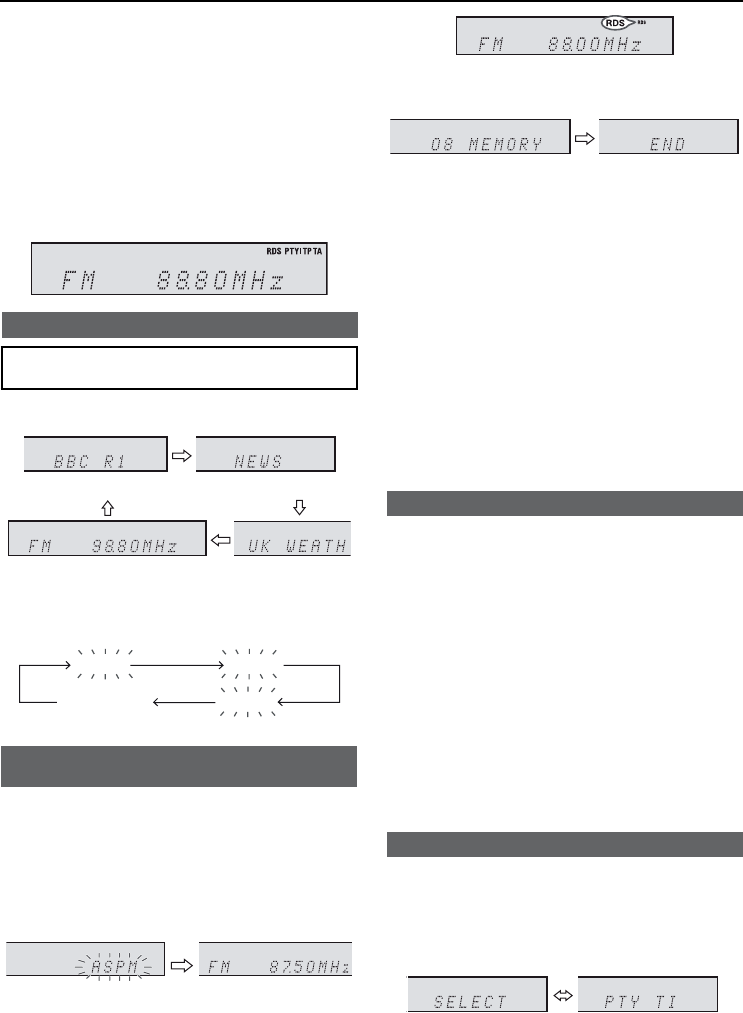
E-13
RDS is a broadcasting service which a growing
number of FM stations provide. These FM stations
send additional signals along with their regular pro-
gramme signals. They send their station names, and
information about the type of programme such as
sport, music, etc.
When tuned to an RDS station, “RDS” and the station
name will be displayed.
“TP” (Trafc Programme) will appear on the display when
the received broadcast carries trafc information, and “TA”
(Trafc Announcement) will appear whilst a trafc informa-
tion is on air.“
“PTYI” (Dynamic PTY Indicator) will appear whilst the Dy-
namic PTY station is received.
■ Information provided by RDS
You can control the RDS by using the buttons on
the remote control only.
Each time the RDS DISP button is pressed, the display
will switch as follows:
Station name (PS) Programme type (PTY)
Radio text (RT)Frequency
When tuning in to a station other than an RDS station or to
an RDS station which sends weak signal, the display will
change in the following order:
NO PS NO PTY
FM 98.80 MHz
NO RT
■ Using the Auto Station Programme
Memory (ASPM)
While in the ASPM operation mode, the tuner will auto-
matically search for new RDS stations. Up to 30 stations
can be stored.
1 Press the TUNER [DAB] button (remote control) or
FUNCTION button (main unit) repeatedly to select
TUNER function.
2 Press and hold the RDS ASPM button.
1 After “ASPM” has ashed for about 4 seconds,
scanning will start (87.50 - 108.00 MHz).
2 When an RDS station is found, “RDS” will appear
for a short time and the station will be stored in
memory.
3 After scanning, the number of stations stored in
memory will be displayed for 4 seconds, and then
“END” will appear for 4 seconds.
To stop the ASPM operation before it is complete:
Press the RDS ASPM button while it is scanning for stations.
The stations which are already stored in memory will be
kept there.
Notes:
● If the same station is broadcasting on different frequen-
cies, the strongest frequency will be stored in memory.
● Any station which has the same frequency as the one
stored in memory will not be stored.
● If 30 stations have already been stored in memory, the
scan will be aborted. If you want to redo the ASPM
operation, erase the preset memory.
● If no station have been stored in memory, “END” will
appear for about 4 seconds.
● If the RDS signals are very weak, station names may
not be stored in memory.
● The same station name can be stored in different
channels.
● In a certain area or during certain time periods, the
station names may be different.
■ Notes for RDS operation
If any of the following events occur, it does not mean
that the unit is faulty:
● “PS”, “No PS” and a station name appear alternately,
and the unit does not operate properly.
● If a particular station is not broadcasting properly or a
station is conducting tests, the RDS reception function
may not work properly.
● When you receive an RDS station whose signal is too
weak, information like the station name may not be
displayed.
● “No PS”, “No PTY” or “No RT” will ash for about 5
seconds, and then the frequency will be displayed.
Notes for radio text:
● The rst 14 characters of the radio text will appear for 4
seconds and then they will scroll across the display.
● If you tune in to an RDS station which is not broadcast-
ing any radio text, “No RT” will be displayed when you
switch to the radio text position.
● While radio text data is received or when the text con-
tents change, “RT” will be displayed.
■ To recall stations in memory
To specify programmed types (news, sports, trafc
programme, etc..) and select stations (PTY search):
1 Press the TUNER [DAB] button (remote control) or
FUNCTION button (main unit) repeatedly to select TUN-
ER function.
2 Press the RDS PTY button.
“SELECT” and “PTY TI” will appear alternately for about
6 seconds.
Using the Radio Data System (RDS)


















